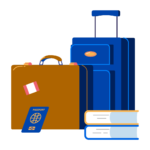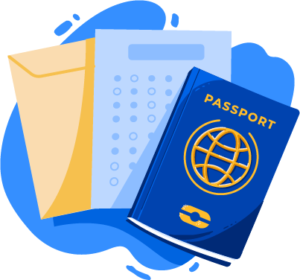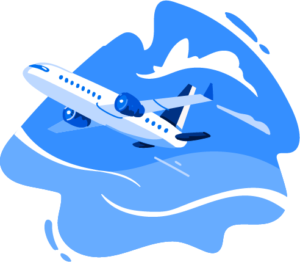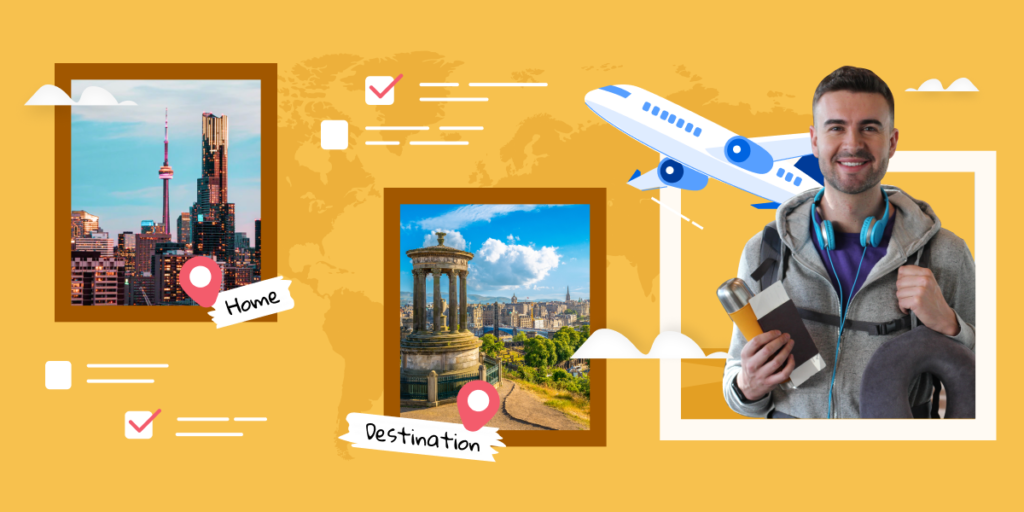Studying abroad is an exciting adventure. However, it can be difficult to know exactly what you need to bring and leave behind before travelling to study in Canada, the United States, the United Kingdom, Australia, or Ireland. To help you understand what to expect when you arrive at your study abroad destination, we’ve created a packing list for international students, as well as travel tips. It will help prepare you for your next steps in Canada, Australia, the US, the UK, or Ireland, and ensure your travel experience is as smooth as possible!
Want to study abroad? Choose from five different destinations and thousands of programs and courses on the �����鶹 platform.
Travel Information
Travel requirements for specific nations change regularly. To ensure you have up-to-date info, we recommend checking the individual country’s government websites for the latest information:

Travel Tips for International Students
Before you start your packing list for international students, Canada, Australia, the US, the UK, or Ireland, take a look at some of our travel tips for students. Start preparing for your journey by:
- Monitoring the cost of flights
- Verifying luggage restrictions with the airline
- Packing for all sorts of weather
- Checking what you can’t bring through customs, such as animals, plants, fresh fruits and vegetables, meat products, controlled substances, etc.
- Purchasing travel and health insurance (if needed)
- Practicing your communication skills in the country you’ll be studying in
Tip: You might consider a travel agent if you’re unsure of how to book a flight yourself. If you are booking a return flight, we recommend the flexible flight ticket as dates may change and you may want to leave at a later or sooner time. This way you will avoid additional fees.
Can I bring my pet while studying abroad? Read this article to find out!

Documents Packing List for International Students
Prepare ahead of time by packing your documents. You will be asked to show your travel and study-related documents to the Border Control Officers for clearance before leaving the airport. They must be physical, paper documents—not stored on an electronic device, such as a mobile phone or tablet.
Ensure that you include them in your packing list for international students. This will make your next step in Canada, Australia, the US, the UK, or Ireland that much easier. Make sure that these key documents are easily accessible, so you can produce them when asked. Keep your study and permit documents in your carry-on; don’t check them in with your luggage!
Tip: A folder or binder will help you keep everything organized and in one spot.
Key Documents to Have:
- A valid passport
- A valid study visa (what this looks like will vary from country to country)
- An extra copy of your passport and visa (email a scan to yourself—and a family member, to be safe!)
- Your Letter of Acceptance/Admission and a printed page listing any relevant information about the program or course you are studying
- Original or certified copies of your academic transcripts and qualifications
- Proof of payment for accommodation, tuition fees, and any other major purchases
- Other personal identification documents, such as a birth certificate, ID card, and driver’s licence
- Proof of financial support (evidence that you have enough money to cover your expenses, such as bank statements used to support your visa application)
- Accommodation confirmation and full address
- University or college address and contact details
- Any health or travel insurance documents
- X-rays (if required)
- The college or university’s 24-hour helpline number
- Details of any pre-arranged transportation provided by the college or university (you’re encouraged to book this if available)
- Any additional relevant documentation that you can think of!
Also, read our guide on making the most of your first week studying abroad!

Other Items for Your Packing List for International Students
You should also add the following items to your packing list for international students to prepare you for next steps in Canada, Australia, the US, the UK, or Ireland. You can bring these items with you on the plane (in your carry-on, not your checked luggage):
- Cash. You can set up a bank account when you arrive, so don’t carry too much.
- Prescription medication. However, you shouldn’t need more than a few weeks’ worth. Bring any prescriptions with you (in English), so you can have them filled when you arrive. Double check what medication you’re allowed to bring with you.
- Electronic devices. That includes a travel adaptor, laptop, phone, and any other devices you will require.
- Warm clothing. Even Australia gets cold sometimes!
- A list of items in your luggage and a description of your luggage. Don’t forget to attach a luggage tag with your full name and telephone number on your checked bags. An AirTag or similar product can also be helpful.
- A few face masks and sanitizing products. You don’t want to get sick while travelling. Remember that you can’t take liquids over 100 mL on the plane.
What Not to Include in Your Packing List
Avoid the following items in your packing list for international students. It will help make your next step in Canada, the US, the UK, Ireland, or Australia run more smoothly (and make traveling easier):
- Bedding and linens
- Kitchen equipment
- Large amounts of toiletries: you can often purchase these after arriving
- Meat, dairy, fruit, vegetables, and potato-based products: these items are against the law to travel with

What to Expect Upon Arrival
Upon arriving by air, you will pass through immigration control before picking up your baggage. Make sure you have the documents mentioned above easily accessible.
The Immigration Officer will ask you some questions to ensure that you’re coming to your study abroad destination for study purposes and that you intend to leave after completing your studies. You must be able to answer these questions clearly without having to rely on an interpreter.
For more details, read our guides on the UK Credibility Interview, the US F-1 Visa Interview, or the Canadian Student Visa Interview.
Some common questions an Immigration Officer may ask:
- What is your name?
- Where are you from? What is your home address?
- What are your mother’s and father’s names?
- Where were you born, and what is your birth date?
- What university or college are you going to attend?
- Which program/course are you going to study, and how long is it?
- What are your plans after completing the program/course?
- Who packed your bag(s)? Do you know what’s inside the bag(s)?
- How much cash are you carrying with you?
- Do you have relatives/friends/family here? If so, where do they live? If not, where will you stay?
- Is someone coming to pick you up at the airport?
You should respond to all questions asked by the Immigration Officer with simple and clear answers. If you don’t hear or understand a question, you can ask the officer for clarification.
We hope this packing list and travel tips for students for international students to prepare for your next step in Canada, Australia, the US, the UK, and Ireland will help you prepare for the challenges ahead! Finally, you can collect your baggage and officially begin your study abroad adventure. Best of luck!
Ready to go? Start exploring your study abroad options on �����鶹.







